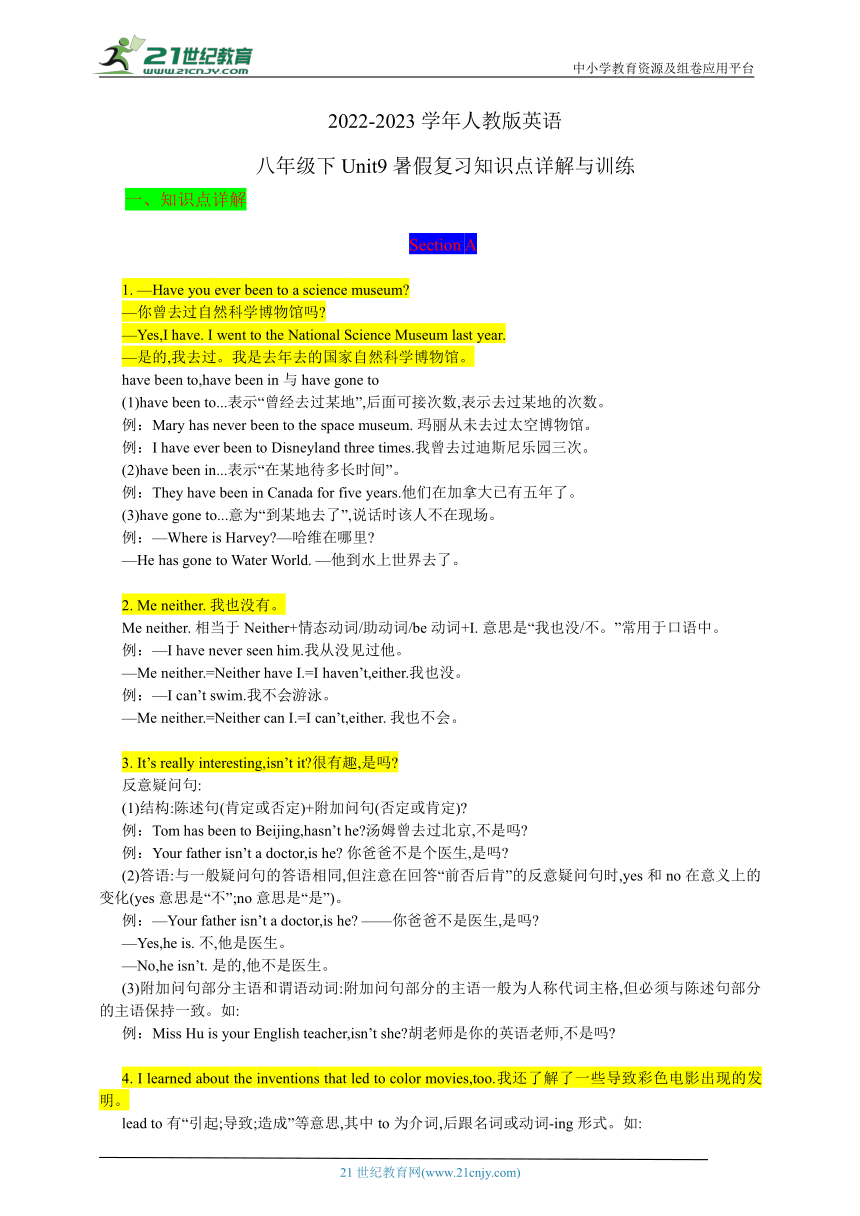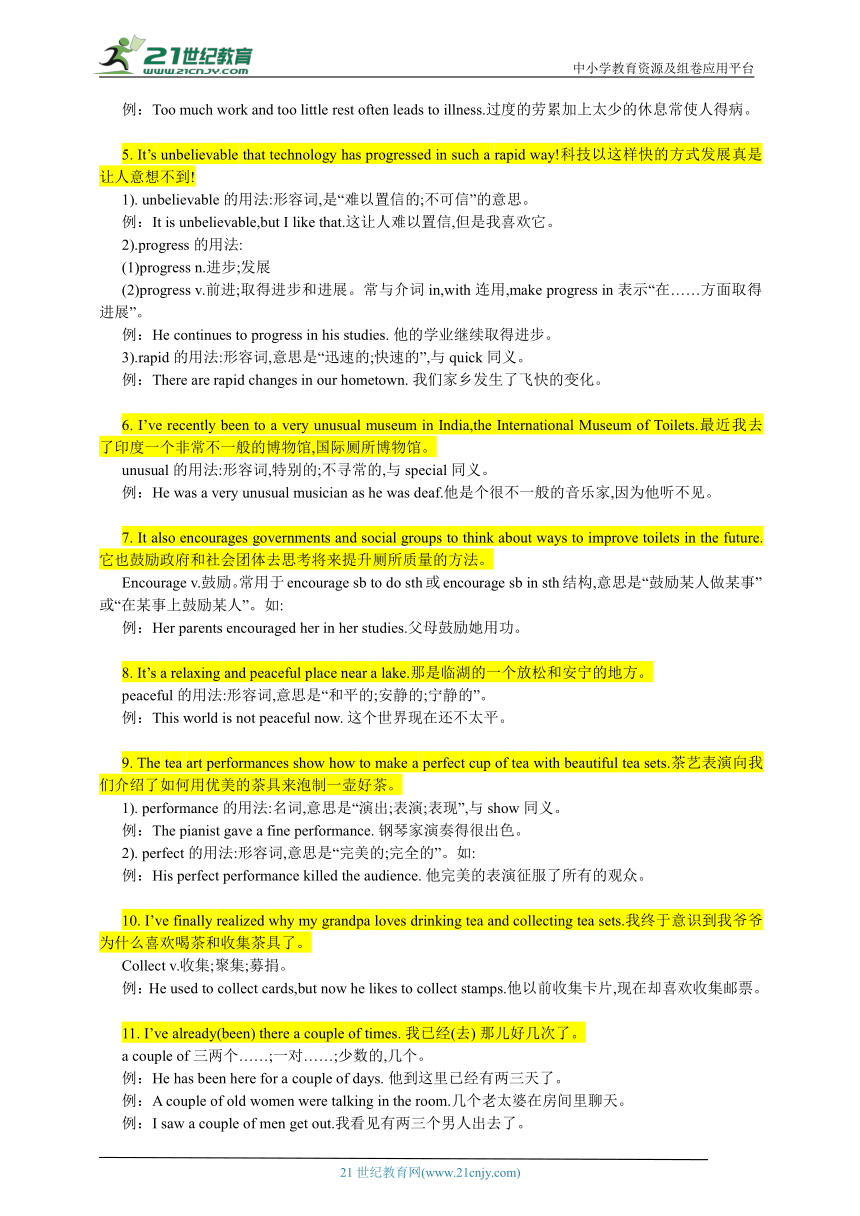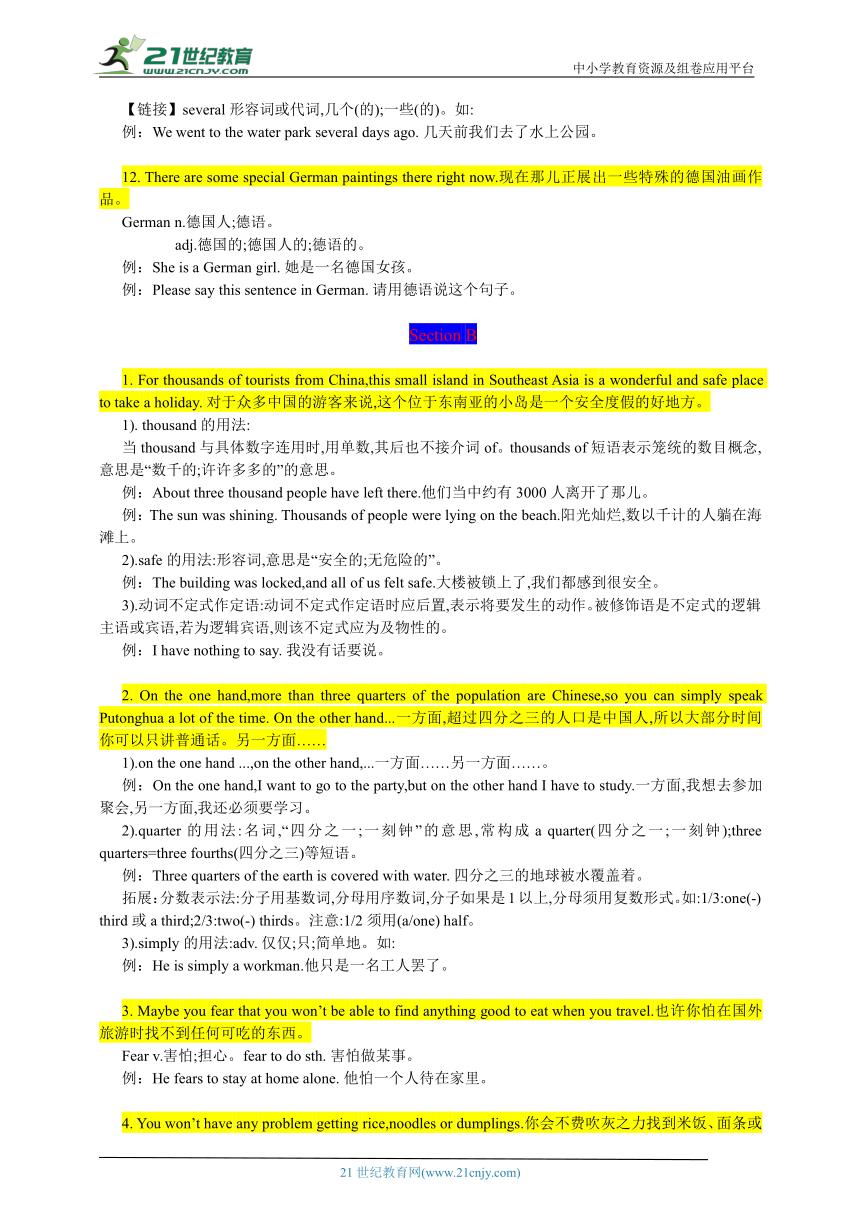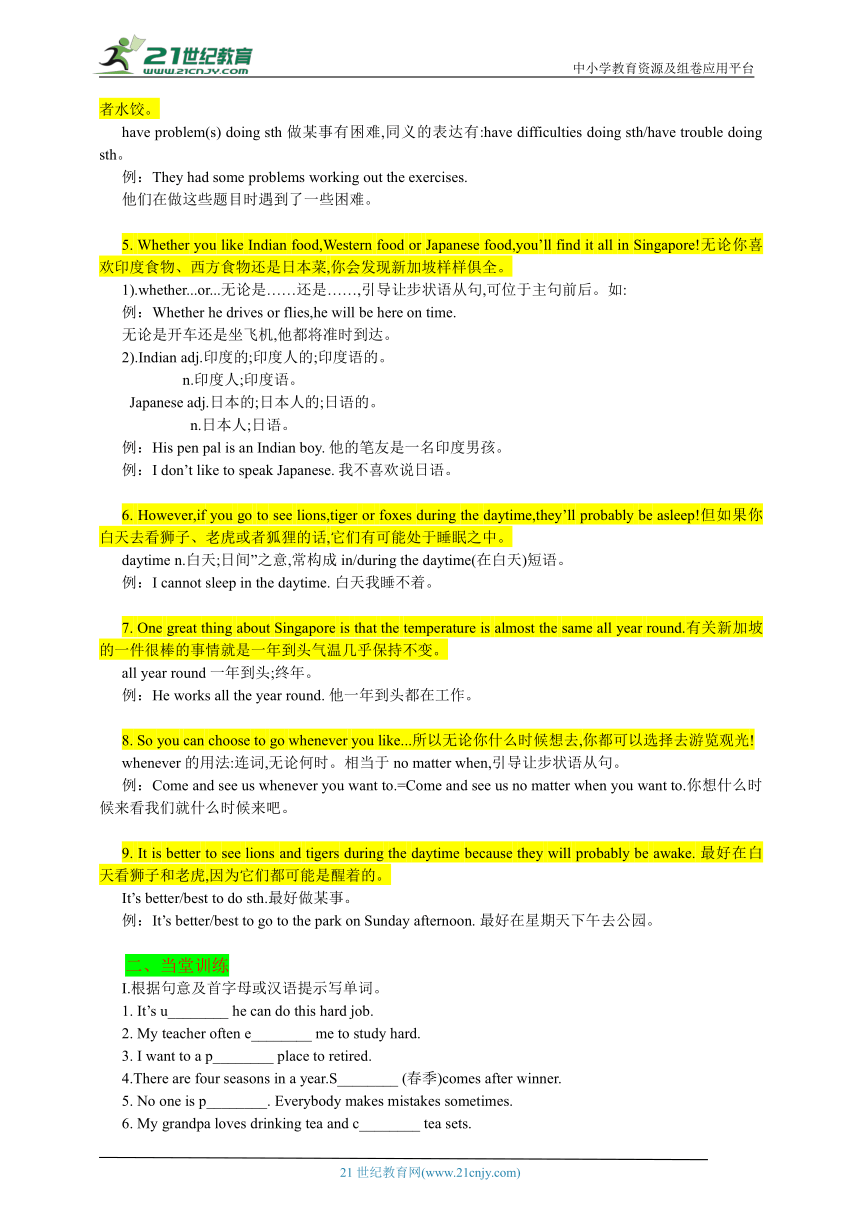【暑假学案】Unit 9 Have you ever been to a museum? 暑假复习知识点详解与训练(人教版英语八年级下)
文档属性
| 名称 | 【暑假学案】Unit 9 Have you ever been to a museum? 暑假复习知识点详解与训练(人教版英语八年级下) |  | |
| 格式 | doc | ||
| 文件大小 | 1.2MB | ||
| 资源类型 | 试卷 | ||
| 版本资源 | 人教新目标(Go for it)版 | ||
| 科目 | 英语 | ||
| 更新时间 | 2023-07-18 15:55:28 | ||
图片预览




文档简介
中小学教育资源及组卷应用平台
2022-2023学年人教版英语
八年级下Unit9暑假复习知识点详解与训练
一、知识点详解
Section A
1. —Have you ever been to a science museum
—你曾去过自然科学博物馆吗
—Yes,I have. I went to the National Science Museum last year.
—是的,我去过。我是去年去的国家自然科学博物馆。
have been to,have been in与have gone to
(1)have been to...表示“曾经去过某地”,后面可接次数,表示去过某地的次数。
例:Mary has never been to the space museum. 玛丽从未去过太空博物馆。
例:I have ever been to Disneyland three times.我曾去过迪斯尼乐园三次。
(2)have been in...表示“在某地待多长时间”。
例:They have been in Canada for five years.他们在加拿大已有五年了。
(3)have gone to...意为“到某地去了”,说话时该人不在现场。
例:—Where is Harvey —哈维在哪里
—He has gone to Water World. —他到水上世界去了。
2. Me neither. 我也没有。
Me neither. 相当于Neither+情态动词/助动词/be动词+I. 意思是“我也没/不。”常用于口语中。
例:—I have never seen him.我从没见过他。
—Me neither.=Neither have I.=I haven’t,either.我也没。
例:—I can’t swim.我不会游泳。
—Me neither.=Neither can I.=I can’t,either. 我也不会。
3. It’s really interesting,isn’t it 很有趣,是吗
反意疑问句:
(1)结构:陈述句(肯定或否定)+附加问句(否定或肯定)
例:Tom has been to Beijing,hasn’t he 汤姆曾去过北京,不是吗
例:Your father isn’t a doctor,is he 你爸爸不是个医生,是吗
(2)答语:与一般疑问句的答语相同,但注意在回答“前否后肯”的反意疑问句时,yes和no在意义上的变化(yes意思是“不”;no意思是“是”)。
例:—Your father isn’t a doctor,is he ——你爸爸不是医生,是吗
—Yes,he is. 不,他是医生。
—No,he isn’t. 是的,他不是医生。
(3)附加问句部分主语和谓语动词:附加问句部分的主语一般为人称代词主格,但必须与陈述句部分的主语保持一致。如:
例:Miss Hu is your English teacher,isn’t she 胡老师是你的英语老师,不是吗
4. I learned about the inventions that led to color movies,too.我还了解了一些导致彩色电影出现的发明。
lead to有“引起;导致;造成”等意思,其中to为介词,后跟名词或动词-ing形式。如:
例:Too much work and too little rest often leads to illness.过度的劳累加上太少的休息常使人得病。
5. It’s unbelievable that technology has progressed in such a rapid way!科技以这样快的方式发展真是让人意想不到!
1). unbelievable的用法:形容词,是“难以置信的;不可信”的意思。
例:It is unbelievable,but I like that.这让人难以置信,但是我喜欢它。
2).progress的用法:
(1)progress n.进步;发展
(2)progress v.前进;取得进步和进展。常与介词in,with连用,make progress in表示“在……方面取得进展”。
例:He continues to progress in his studies. 他的学业继续取得进步。
3).rapid的用法:形容词,意思是“迅速的;快速的”,与quick同义。
例:There are rapid changes in our hometown. 我们家乡发生了飞快的变化。
6. I’ve recently been to a very unusual museum in India,the International Museum of Toilets.最近我去了印度一个非常不一般的博物馆,国际厕所博物馆。
unusual的用法:形容词,特别的;不寻常的,与special同义。
例:He was a very unusual musician as he was deaf.他是个很不一般的音乐家,因为他听不见。
7. It also encourages governments and social groups to think about ways to improve toilets in the future.它也鼓励政府和社会团体去思考将来提升厕所质量的方法。
Encourage v.鼓励。常用于encourage sb to do sth或encourage sb in sth结构,意思是“鼓励某人做某事”或“在某事上鼓励某人”。如:
例:Her parents encouraged her in her studies.父母鼓励她用功。
8. It’s a relaxing and peaceful place near a lake.那是临湖的一个放松和安宁的地方。
peaceful的用法:形容词,意思是“和平的;安静的;宁静的”。
例:This world is not peaceful now. 这个世界现在还不太平。
9. The tea art performances show how to make a perfect cup of tea with beautiful tea sets.茶艺表演向我们介绍了如何用优美的茶具来泡制一壶好茶。
1). performance的用法:名词,意思是“演出;表演;表现”,与show同义。
例:The pianist gave a fine performance. 钢琴家演奏得很出色。
2). perfect的用法:形容词,意思是“完美的;完全的”。如:
例:His perfect performance killed the audience. 他完美的表演征服了所有的观众。
10. I’ve finally realized why my grandpa loves drinking tea and collecting tea sets.我终于意识到我爷爷为什么喜欢喝茶和收集茶具了。
Collect v.收集;聚集;募捐。
例:He used to collect cards,but now he likes to collect stamps.他以前收集卡片,现在却喜欢收集邮票。
11. I’ve already(been) there a couple of times. 我已经(去) 那儿好几次了。
a couple of三两个……;一对……;少数的,几个。
例:He has been here for a couple of days. 他到这里已经有两三天了。
例:A couple of old women were talking in the room.几个老太婆在房间里聊天。
例:I saw a couple of men get out.我看见有两三个男人出去了。
【链接】several 形容词或代词,几个(的);一些(的)。如:
例:We went to the water park several days ago. 几天前我们去了水上公园。
12. There are some special German paintings there right now.现在那儿正展出一些特殊的德国油画作品。
German n.德国人;德语。
adj.德国的;德国人的;德语的。
例:She is a German girl. 她是一名德国女孩。
例:Please say this sentence in German. 请用德语说这个句子。
Section B
1. For thousands of tourists from China,this small island in Southeast Asia is a wonderful and safe place to take a holiday. 对于众多中国的游客来说,这个位于东南亚的小岛是一个安全度假的好地方。
1). thousand的用法:
当thousand与具体数字连用时,用单数,其后也不接介词of。thousands of 短语表示笼统的数目概念,意思是“数千的;许许多多的”的意思。
例:About three thousand people have left there.他们当中约有3000人离开了那儿。
例:The sun was shining. Thousands of people were lying on the beach.阳光灿烂,数以千计的人躺在海滩上。
2).safe的用法:形容词,意思是“安全的;无危险的”。
例:The building was locked,and all of us felt safe.大楼被锁上了,我们都感到很安全。
3).动词不定式作定语:动词不定式作定语时应后置,表示将要发生的动作。被修饰语是不定式的逻辑主语或宾语,若为逻辑宾语,则该不定式应为及物性的。
例:I have nothing to say. 我没有话要说。
2. On the one hand,more than three quarters of the population are Chinese,so you can simply speak Putonghua a lot of the time. On the other hand...一方面,超过四分之三的人口是中国人,所以大部分时间你可以只讲普通话。另一方面……
1).on the one hand ...,on the other hand,...一方面……另一方面……。
例:On the one hand,I want to go to the party,but on the other hand I have to study.一方面,我想去参加聚会,另一方面,我还必须要学习。
2).quarter的用法:名词,“四分之一;一刻钟”的意思,常构成a quarter(四分之一;一刻钟);three quarters=three fourths(四分之三)等短语。
例:Three quarters of the earth is covered with water. 四分之三的地球被水覆盖着。
拓展:分数表示法:分子用基数词,分母用序数词,分子如果是1以上,分母须用复数形式。如:1/3:one(-) third或a third;2/3:two(-) thirds。注意:1/2须用(a/one) half。
3).simply的用法:adv. 仅仅;只;简单地。如:
例:He is simply a workman.他只是一名工人罢了。
3. Maybe you fear that you won’t be able to find anything good to eat when you travel.也许你怕在国外旅游时找不到任何可吃的东西。
Fear v.害怕;担心。fear to do sth. 害怕做某事。
例:He fears to stay at home alone. 他怕一个人待在家里。
4. You won’t have any problem getting rice,noodles or dumplings.你会不费吹灰之力找到米饭、面条或者水饺。
have problem(s) doing sth 做某事有困难,同义的表达有:have difficulties doing sth/have trouble doing sth。
例:They had some problems working out the exercises.
他们在做这些题目时遇到了一些困难。
5. Whether you like Indian food,Western food or Japanese food,you’ll find it all in Singapore!无论你喜欢印度食物、西方食物还是日本菜,你会发现新加坡样样俱全。
1).whether...or...无论是……还是……,引导让步状语从句,可位于主句前后。如:
例:Whether he drives or flies,he will be here on time.
无论是开车还是坐飞机,他都将准时到达。
2).Indian adj.印度的;印度人的;印度语的。
n.印度人;印度语。
Japanese adj.日本的;日本人的;日语的。
n.日本人;日语。
例:His pen pal is an Indian boy. 他的笔友是一名印度男孩。
例:I don’t like to speak Japanese. 我不喜欢说日语。
6. However,if you go to see lions,tiger or foxes during the daytime,they’ll probably be asleep!但如果你白天去看狮子、老虎或者狐狸的话,它们有可能处于睡眠之中。
daytime n.白天;日间”之意,常构成in/during the daytime(在白天)短语。
例:I cannot sleep in the daytime. 白天我睡不着。
7. One great thing about Singapore is that the temperature is almost the same all year round.有关新加坡的一件很棒的事情就是一年到头气温几乎保持不变。
all year round一年到头;终年。
例:He works all the year round. 他一年到头都在工作。
8. So you can choose to go whenever you like...所以无论你什么时候想去,你都可以选择去游览观光!
whenever的用法:连词,无论何时。相当于no matter when,引导让步状语从句。
例:Come and see us whenever you want to.=Come and see us no matter when you want to.你想什么时候来看我们就什么时候来吧。
9. It is better to see lions and tigers during the daytime because they will probably be awake. 最好在白天看狮子和老虎,因为它们都可能是醒着的。
It’s better/best to do sth.最好做某事。
例:It’s better/best to go to the park on Sunday afternoon. 最好在星期天下午去公园。
二、当堂训练
I.根据句意及首字母或汉语提示写单词。
1. It’s u________ he can do this hard job.
2. My teacher often e________ me to study hard.
3. I want to a p________ place to retired.
4.There are four seasons in a year.S________ (春季)comes after winner.
5. No one is p________. Everybody makes mistakes sometimes.
6. My grandpa loves drinking tea and c________ tea sets.
7. Have you ever been to an a________ (娱乐) park
8. The International Museum of Toilets is a very u________ (不寻常的) museum.
9. There are some special German p________ (油画) in the art museum.
10. W________ (不管.......还是)it is rainy or not, we should go to school on time.
II.用所给单词的适当形式填空。
1.The Hangzhou National Tea Museum is a relaxing and ________ (peace) place .
2.Mr.Li often ________ (encourage) us to think about ways to improve our studies.
3. Have you ever tried ________ (Japan) food
4. My grandpa loves drinking tea and ________ (collect)tea sets.
5. Have you ever ________ (hear) of the Night Safari in Singapore
6. Would you like an ________ (India) or a Chinese meal
7. They didn’t have any problem ________ (find) a Chinese restaurant there.
8. They ________ already ________ (be) to the history museum.
9. —When ________ you ________ (buy) the house
—Last year.
10. —Have you been to the Center Park
—No. But I ________(go) there next weekend.
III.单项选择。
1. Many ________ tourists go to the Night Safari every year.
A. thousand B. thousands C. thousand of D. thousands of
2. The Hangzhou National Tea museum is a great place ________ tea.
A. enjoy B. enjoying C. enjoyed D. to enjoy
3.A number of tourists ________ Yangzhou many times because it is such a beautiful city.
A. have been to B. has been to C. has gone to D. have gone to
4. My parents always encourage me ________ hard.
A.study B.studied C.studying D.to study
5. Foxes and lions are ________ during the night, and we can see them walking.
A. awake B. alone C. asleep D. wake
6. The Smiths have lived here with us ________ 1999.
A. for B. since C. before D. in
7. When my mother came back home last night, I was still ________.
A. wake B. woke C. waking D. awake
8. ________ you are free, come to my home and let’s have some coffee.
A. Whatever B. Whenever C. Whoever D. However
9. He has ________ from Singapore for a week.
A. got back B. been back C. went back D. come back
10. Thomas Edison invented ________ light bulb (灯泡). He was ________ unusual man.
A. a; a B. an; the C. the; an D. a; /
IV.翻译。
1. 上周末我和妹妹去那个游乐场了。
I went to the ________ ________ with my sister last weekend.
2. 我弟弟从未去过海南。
My brother ________ ________ ________ ________ Hainan.
3. 过度工作而过少休息经常导致疾病。
Too much work and too little rest often ________ ________ illness.
4. 我们喜欢在山上露营。
We like ________ ________ ________ ________.
5. 今天去溜冰是个好主意。
It’s a good idea to ________ ________ today.
6. 他刚刚开始收集茶具。
He ________ just ________ to ________ ________ ________.
7. 孩子们去过那个岛两次了。
Children ________ ________ to that island ________.
8. 我在这儿几天了。
I ________ ________ here for ________ ________ ________ days.
9. 新加坡的天气一年到头都很暖和。
The weather in Singapore is warm ________ ________ ________.
10. 全球大约四分之三的玩具是中国制造的。
About ________ ________ of the world’s toys are made in China.
答案
I.1.unbelievable 2.encourages 3.peaceful 4.Spring 5.perfect
6.collecting 7.amusement 8.unusual 9.paintings 10.Whether
II.1.peaceful 2.encourages 3.Japanese 4.collecting 5.heard
6.Indian 7.finding 8.have been 9.did buy 10.will go
III.1-5ADADA 6-10BDBBC
IV.1.amusement park 2.has never been to 3.lead to 4.camping in the mountains
5.go skating 6.has begun collect tea sets 7.have been twice
8.have been a couple of 9.all year round 10.three quarters
21世纪教育网 www.21cnjy.com 精品试卷·第 2 页 (共 2 页)
HYPERLINK "http://21世纪教育网(www.21cnjy.com)
" 21世纪教育网(www.21cnjy.com)
2022-2023学年人教版英语
八年级下Unit9暑假复习知识点详解与训练
一、知识点详解
Section A
1. —Have you ever been to a science museum
—你曾去过自然科学博物馆吗
—Yes,I have. I went to the National Science Museum last year.
—是的,我去过。我是去年去的国家自然科学博物馆。
have been to,have been in与have gone to
(1)have been to...表示“曾经去过某地”,后面可接次数,表示去过某地的次数。
例:Mary has never been to the space museum. 玛丽从未去过太空博物馆。
例:I have ever been to Disneyland three times.我曾去过迪斯尼乐园三次。
(2)have been in...表示“在某地待多长时间”。
例:They have been in Canada for five years.他们在加拿大已有五年了。
(3)have gone to...意为“到某地去了”,说话时该人不在现场。
例:—Where is Harvey —哈维在哪里
—He has gone to Water World. —他到水上世界去了。
2. Me neither. 我也没有。
Me neither. 相当于Neither+情态动词/助动词/be动词+I. 意思是“我也没/不。”常用于口语中。
例:—I have never seen him.我从没见过他。
—Me neither.=Neither have I.=I haven’t,either.我也没。
例:—I can’t swim.我不会游泳。
—Me neither.=Neither can I.=I can’t,either. 我也不会。
3. It’s really interesting,isn’t it 很有趣,是吗
反意疑问句:
(1)结构:陈述句(肯定或否定)+附加问句(否定或肯定)
例:Tom has been to Beijing,hasn’t he 汤姆曾去过北京,不是吗
例:Your father isn’t a doctor,is he 你爸爸不是个医生,是吗
(2)答语:与一般疑问句的答语相同,但注意在回答“前否后肯”的反意疑问句时,yes和no在意义上的变化(yes意思是“不”;no意思是“是”)。
例:—Your father isn’t a doctor,is he ——你爸爸不是医生,是吗
—Yes,he is. 不,他是医生。
—No,he isn’t. 是的,他不是医生。
(3)附加问句部分主语和谓语动词:附加问句部分的主语一般为人称代词主格,但必须与陈述句部分的主语保持一致。如:
例:Miss Hu is your English teacher,isn’t she 胡老师是你的英语老师,不是吗
4. I learned about the inventions that led to color movies,too.我还了解了一些导致彩色电影出现的发明。
lead to有“引起;导致;造成”等意思,其中to为介词,后跟名词或动词-ing形式。如:
例:Too much work and too little rest often leads to illness.过度的劳累加上太少的休息常使人得病。
5. It’s unbelievable that technology has progressed in such a rapid way!科技以这样快的方式发展真是让人意想不到!
1). unbelievable的用法:形容词,是“难以置信的;不可信”的意思。
例:It is unbelievable,but I like that.这让人难以置信,但是我喜欢它。
2).progress的用法:
(1)progress n.进步;发展
(2)progress v.前进;取得进步和进展。常与介词in,with连用,make progress in表示“在……方面取得进展”。
例:He continues to progress in his studies. 他的学业继续取得进步。
3).rapid的用法:形容词,意思是“迅速的;快速的”,与quick同义。
例:There are rapid changes in our hometown. 我们家乡发生了飞快的变化。
6. I’ve recently been to a very unusual museum in India,the International Museum of Toilets.最近我去了印度一个非常不一般的博物馆,国际厕所博物馆。
unusual的用法:形容词,特别的;不寻常的,与special同义。
例:He was a very unusual musician as he was deaf.他是个很不一般的音乐家,因为他听不见。
7. It also encourages governments and social groups to think about ways to improve toilets in the future.它也鼓励政府和社会团体去思考将来提升厕所质量的方法。
Encourage v.鼓励。常用于encourage sb to do sth或encourage sb in sth结构,意思是“鼓励某人做某事”或“在某事上鼓励某人”。如:
例:Her parents encouraged her in her studies.父母鼓励她用功。
8. It’s a relaxing and peaceful place near a lake.那是临湖的一个放松和安宁的地方。
peaceful的用法:形容词,意思是“和平的;安静的;宁静的”。
例:This world is not peaceful now. 这个世界现在还不太平。
9. The tea art performances show how to make a perfect cup of tea with beautiful tea sets.茶艺表演向我们介绍了如何用优美的茶具来泡制一壶好茶。
1). performance的用法:名词,意思是“演出;表演;表现”,与show同义。
例:The pianist gave a fine performance. 钢琴家演奏得很出色。
2). perfect的用法:形容词,意思是“完美的;完全的”。如:
例:His perfect performance killed the audience. 他完美的表演征服了所有的观众。
10. I’ve finally realized why my grandpa loves drinking tea and collecting tea sets.我终于意识到我爷爷为什么喜欢喝茶和收集茶具了。
Collect v.收集;聚集;募捐。
例:He used to collect cards,but now he likes to collect stamps.他以前收集卡片,现在却喜欢收集邮票。
11. I’ve already(been) there a couple of times. 我已经(去) 那儿好几次了。
a couple of三两个……;一对……;少数的,几个。
例:He has been here for a couple of days. 他到这里已经有两三天了。
例:A couple of old women were talking in the room.几个老太婆在房间里聊天。
例:I saw a couple of men get out.我看见有两三个男人出去了。
【链接】several 形容词或代词,几个(的);一些(的)。如:
例:We went to the water park several days ago. 几天前我们去了水上公园。
12. There are some special German paintings there right now.现在那儿正展出一些特殊的德国油画作品。
German n.德国人;德语。
adj.德国的;德国人的;德语的。
例:She is a German girl. 她是一名德国女孩。
例:Please say this sentence in German. 请用德语说这个句子。
Section B
1. For thousands of tourists from China,this small island in Southeast Asia is a wonderful and safe place to take a holiday. 对于众多中国的游客来说,这个位于东南亚的小岛是一个安全度假的好地方。
1). thousand的用法:
当thousand与具体数字连用时,用单数,其后也不接介词of。thousands of 短语表示笼统的数目概念,意思是“数千的;许许多多的”的意思。
例:About three thousand people have left there.他们当中约有3000人离开了那儿。
例:The sun was shining. Thousands of people were lying on the beach.阳光灿烂,数以千计的人躺在海滩上。
2).safe的用法:形容词,意思是“安全的;无危险的”。
例:The building was locked,and all of us felt safe.大楼被锁上了,我们都感到很安全。
3).动词不定式作定语:动词不定式作定语时应后置,表示将要发生的动作。被修饰语是不定式的逻辑主语或宾语,若为逻辑宾语,则该不定式应为及物性的。
例:I have nothing to say. 我没有话要说。
2. On the one hand,more than three quarters of the population are Chinese,so you can simply speak Putonghua a lot of the time. On the other hand...一方面,超过四分之三的人口是中国人,所以大部分时间你可以只讲普通话。另一方面……
1).on the one hand ...,on the other hand,...一方面……另一方面……。
例:On the one hand,I want to go to the party,but on the other hand I have to study.一方面,我想去参加聚会,另一方面,我还必须要学习。
2).quarter的用法:名词,“四分之一;一刻钟”的意思,常构成a quarter(四分之一;一刻钟);three quarters=three fourths(四分之三)等短语。
例:Three quarters of the earth is covered with water. 四分之三的地球被水覆盖着。
拓展:分数表示法:分子用基数词,分母用序数词,分子如果是1以上,分母须用复数形式。如:1/3:one(-) third或a third;2/3:two(-) thirds。注意:1/2须用(a/one) half。
3).simply的用法:adv. 仅仅;只;简单地。如:
例:He is simply a workman.他只是一名工人罢了。
3. Maybe you fear that you won’t be able to find anything good to eat when you travel.也许你怕在国外旅游时找不到任何可吃的东西。
Fear v.害怕;担心。fear to do sth. 害怕做某事。
例:He fears to stay at home alone. 他怕一个人待在家里。
4. You won’t have any problem getting rice,noodles or dumplings.你会不费吹灰之力找到米饭、面条或者水饺。
have problem(s) doing sth 做某事有困难,同义的表达有:have difficulties doing sth/have trouble doing sth。
例:They had some problems working out the exercises.
他们在做这些题目时遇到了一些困难。
5. Whether you like Indian food,Western food or Japanese food,you’ll find it all in Singapore!无论你喜欢印度食物、西方食物还是日本菜,你会发现新加坡样样俱全。
1).whether...or...无论是……还是……,引导让步状语从句,可位于主句前后。如:
例:Whether he drives or flies,he will be here on time.
无论是开车还是坐飞机,他都将准时到达。
2).Indian adj.印度的;印度人的;印度语的。
n.印度人;印度语。
Japanese adj.日本的;日本人的;日语的。
n.日本人;日语。
例:His pen pal is an Indian boy. 他的笔友是一名印度男孩。
例:I don’t like to speak Japanese. 我不喜欢说日语。
6. However,if you go to see lions,tiger or foxes during the daytime,they’ll probably be asleep!但如果你白天去看狮子、老虎或者狐狸的话,它们有可能处于睡眠之中。
daytime n.白天;日间”之意,常构成in/during the daytime(在白天)短语。
例:I cannot sleep in the daytime. 白天我睡不着。
7. One great thing about Singapore is that the temperature is almost the same all year round.有关新加坡的一件很棒的事情就是一年到头气温几乎保持不变。
all year round一年到头;终年。
例:He works all the year round. 他一年到头都在工作。
8. So you can choose to go whenever you like...所以无论你什么时候想去,你都可以选择去游览观光!
whenever的用法:连词,无论何时。相当于no matter when,引导让步状语从句。
例:Come and see us whenever you want to.=Come and see us no matter when you want to.你想什么时候来看我们就什么时候来吧。
9. It is better to see lions and tigers during the daytime because they will probably be awake. 最好在白天看狮子和老虎,因为它们都可能是醒着的。
It’s better/best to do sth.最好做某事。
例:It’s better/best to go to the park on Sunday afternoon. 最好在星期天下午去公园。
二、当堂训练
I.根据句意及首字母或汉语提示写单词。
1. It’s u________ he can do this hard job.
2. My teacher often e________ me to study hard.
3. I want to a p________ place to retired.
4.There are four seasons in a year.S________ (春季)comes after winner.
5. No one is p________. Everybody makes mistakes sometimes.
6. My grandpa loves drinking tea and c________ tea sets.
7. Have you ever been to an a________ (娱乐) park
8. The International Museum of Toilets is a very u________ (不寻常的) museum.
9. There are some special German p________ (油画) in the art museum.
10. W________ (不管.......还是)it is rainy or not, we should go to school on time.
II.用所给单词的适当形式填空。
1.The Hangzhou National Tea Museum is a relaxing and ________ (peace) place .
2.Mr.Li often ________ (encourage) us to think about ways to improve our studies.
3. Have you ever tried ________ (Japan) food
4. My grandpa loves drinking tea and ________ (collect)tea sets.
5. Have you ever ________ (hear) of the Night Safari in Singapore
6. Would you like an ________ (India) or a Chinese meal
7. They didn’t have any problem ________ (find) a Chinese restaurant there.
8. They ________ already ________ (be) to the history museum.
9. —When ________ you ________ (buy) the house
—Last year.
10. —Have you been to the Center Park
—No. But I ________(go) there next weekend.
III.单项选择。
1. Many ________ tourists go to the Night Safari every year.
A. thousand B. thousands C. thousand of D. thousands of
2. The Hangzhou National Tea museum is a great place ________ tea.
A. enjoy B. enjoying C. enjoyed D. to enjoy
3.A number of tourists ________ Yangzhou many times because it is such a beautiful city.
A. have been to B. has been to C. has gone to D. have gone to
4. My parents always encourage me ________ hard.
A.study B.studied C.studying D.to study
5. Foxes and lions are ________ during the night, and we can see them walking.
A. awake B. alone C. asleep D. wake
6. The Smiths have lived here with us ________ 1999.
A. for B. since C. before D. in
7. When my mother came back home last night, I was still ________.
A. wake B. woke C. waking D. awake
8. ________ you are free, come to my home and let’s have some coffee.
A. Whatever B. Whenever C. Whoever D. However
9. He has ________ from Singapore for a week.
A. got back B. been back C. went back D. come back
10. Thomas Edison invented ________ light bulb (灯泡). He was ________ unusual man.
A. a; a B. an; the C. the; an D. a; /
IV.翻译。
1. 上周末我和妹妹去那个游乐场了。
I went to the ________ ________ with my sister last weekend.
2. 我弟弟从未去过海南。
My brother ________ ________ ________ ________ Hainan.
3. 过度工作而过少休息经常导致疾病。
Too much work and too little rest often ________ ________ illness.
4. 我们喜欢在山上露营。
We like ________ ________ ________ ________.
5. 今天去溜冰是个好主意。
It’s a good idea to ________ ________ today.
6. 他刚刚开始收集茶具。
He ________ just ________ to ________ ________ ________.
7. 孩子们去过那个岛两次了。
Children ________ ________ to that island ________.
8. 我在这儿几天了。
I ________ ________ here for ________ ________ ________ days.
9. 新加坡的天气一年到头都很暖和。
The weather in Singapore is warm ________ ________ ________.
10. 全球大约四分之三的玩具是中国制造的。
About ________ ________ of the world’s toys are made in China.
答案
I.1.unbelievable 2.encourages 3.peaceful 4.Spring 5.perfect
6.collecting 7.amusement 8.unusual 9.paintings 10.Whether
II.1.peaceful 2.encourages 3.Japanese 4.collecting 5.heard
6.Indian 7.finding 8.have been 9.did buy 10.will go
III.1-5ADADA 6-10BDBBC
IV.1.amusement park 2.has never been to 3.lead to 4.camping in the mountains
5.go skating 6.has begun collect tea sets 7.have been twice
8.have been a couple of 9.all year round 10.three quarters
21世纪教育网 www.21cnjy.com 精品试卷·第 2 页 (共 2 页)
HYPERLINK "http://21世纪教育网(www.21cnjy.com)
" 21世纪教育网(www.21cnjy.com)
同课章节目录
- Unit 1 What's the matter?
- Section A
- Section B
- Unit 2 I'll help to clean up the city parks.
- Section A
- Section B
- Unit 3 Could you please clean your room?
- Section A
- Section B
- Unit 4 Why don't you talk to your parents?
- Section A
- Section B
- Unit 5 What were you doing when the rainstorm came
- Section A
- Section B
- Review of Units 1-5
- Unit 6 An old man tried to move the mountains.
- Section A
- Section B
- Unit 7 What's the highest mountain in the world?
- Section A
- Section B
- Unit 8 Have you read Treasure Island yet?
- Section A
- Section B
- Unit 9 Have you ever been to a museum?
- Section A
- Section B
- Unit 10 I've had this bike for three years.
- Section A
- Section B
